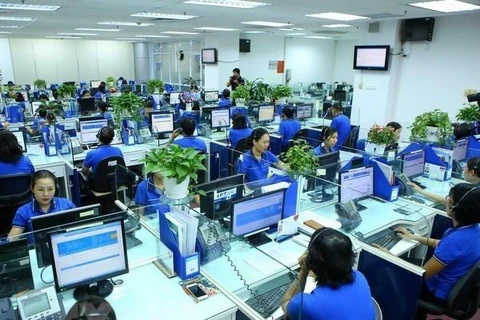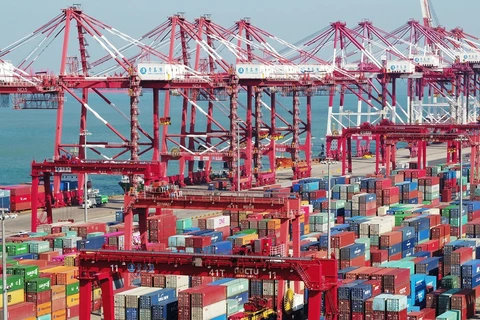
Hanoi (VNA) – “With an appropriate policy, Vietnam can optimise opportunities generated by the Fourth Industrial Revolution to become a developed nation.”
“The digital economy has become an important part of Vietnam’s economy. Vietnam ranks third in the Association of Southeast Asian Nations (ASEAN) in the scale of digital economy. Digital has been applied in industry, agriculture and services, and there are more and more new forms of businesses and services via borders and based on digital technology and internet, helping to create more job opportunities and raise income and living standards of people.”
The remarks were made by Nguyen Van Binh, head of the Party Central Committee’s Economic Commission, at a high-level international forum and exhibition on the Fourth Industrial Revolution.
He said Vietnam aims to promote science-technology and innovation in all sectors, as well as national digital transformation with the focus on building a digital economy, smart urban areas and e-government, towards digital government.
Limited institutions and policies
Vietnam has gained considerable achievements in building e-government towards digital government. The country’s digital government development index is ranked 88th out of 193rd countries, with online public services up 15 places as compared with 2016 to the 59th position.
However, Vietnam was ranked 94th among 140 countries in the World Economic Forum’s institution index last year.
In fact, there are no synchronous institutions regarding the digital economy, sharing economy and innovation, and there is a lack of a legal corridor for the launch of new products and business models in Vietnam.
Besides, the country has yet to set national standards and criteria for the application and development of technological platforms of the Fourth Industrial Revolution in production and daily activities, as well as regulations on the protection of database, and private data and information.
 Nguyen Van Binh, head of the Party Central Committee’s Economic Commission, speaks at the forum. (Photo: VietnamPlus)
Nguyen Van Binh, head of the Party Central Committee’s Economic Commission, speaks at the forum. (Photo: VietnamPlus) A matter of urgency
Speaking at the event, Minister of Information and Communications Nguyen Manh Hung said digital transformation opens up huge opportunities for Vietnam, while creating comprehensive changes for each business, organisation and individual in all spheres.
The official stressed that information-technology firms will serve as the core of the process.
 Minister of Information and Communications Nguyen Manh Hung speaks at the forum. (Photo: VietnamPlus)
Minister of Information and Communications Nguyen Manh Hung speaks at the forum. (Photo: VietnamPlus) According to the minister, Vietnam will announce a strategy on national digital transformation, towards a digital economy and society. Therefore, the country will invest in basic factors, to be included in the world’s top 50 in 2025 and top 30 in 2030 in this regard.
These basic factors comprise institutions, infrastructure, cyber security, platform and training, he added.
Hung suggested Vietnam speeding up digitalisation and IT application across spheres, taking digital transformation as a competitive edge in each sector, gearing towards comprehensive digital economy and forming new-generation digital industries that are expected to drive the national economy.
The Politburo’s Resolution No. 52 also says joining the Fourth Industrial Revolution is a strategic task for both long and short terms of the entire political system and the society.
It is also a breakthrough solution and a suitable step and roadmap to help Vietnam create breakthroughs in socio-economic development, according to the document.
At the forum, Binh stressed the significance of implementing the resolution so that Vietnam can catch up with and even surpass other countries in the region and the world amidst the Fourth Industrial Revolution.
Developing new economic and business models that are digitally driven creates sustainable value for an inclusive economy.
The Fourth Industrial Revolution is rapidly driving transformational disruption across every sector. By 2022, over 60 percent of global GDP will be digitised. An estimated 70 percent of new value created in the economy over the next decade will be based on digitally enabled platforms, according to the World Economic Forum. -VNA






















